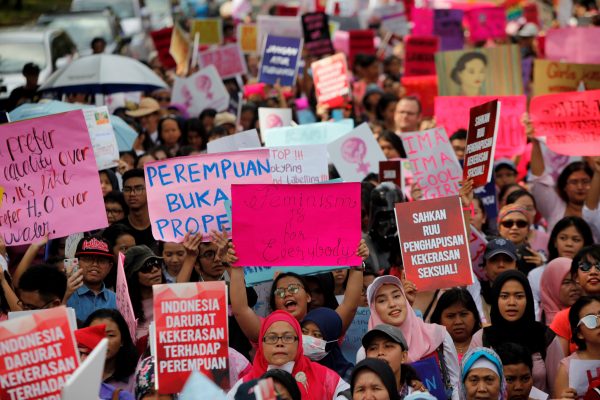Since reformasi, women activists have aspired to increase their voice in directly elected parliaments at national, provincial and district levels. After the first direct elections in 1999, only 8.8 per cent of seats in the national parliament were won by women. This led to demands for the 2003 law on elections to adopt a gender quota. This required parties to ensure that women comprise at least 30 per cent of candidates on party lists for multi-member electorates in national, district and provincial parliaments.
Direct elections where gender quotas apply have been held for district and provincial legislatures since 2004 but have been slower than the national parliament to achieve change. In 2009, women on average won 16 per cent of seats in provincial regional parliaments and 9 per cent at the district and municipal levels. The 2014 elections saw the proportion of women elected to provincial parliaments decline to 14.6 per cent, while there was a 14.2 per cent increase at district and municipal levels.
Indonesia has had one female president, Megawati Sukarnoputri, who was elected under the ‘old system’ by the upper house of Indonesia’s bicameral national parliament. The number of women ministers peaked in President Joko Widodo’s first cabinet, which included eight women, or 24 per cent of his cabinet — above the world average of 17 per cent at the time. In the 2019 elections, women won 21.4 per cent of seats in the national parliament, in line with the 21.1 per cent average for Asia.
Women politicians and the political movements that support them have been instrumental in achieving long demanded legislative reforms, especially in the areas of marriage law and gender-based violence.
Soon after reformasi, women activists proposed a revision to the 1974 Marriage Law, aiming to ban polygyny and raise the age of marriage for girls from 16 to 18. There were also demands to remove the clause establishing men as household heads.
Since its establishment in 2003, the Constitutional Court has become an important site for contesting these issues. The case against raising the minimum marriage age saw the court accept religious arguments against defining adulthood — a clear example of an exercise in the mobilisation of Islamist ideology to challenge women’s rights. The Marriage Act of 2019 eventually brought the minimum age of marriage for women to 19, the same as for men.
Another of the post-reformasi institutions, the National Commission on Violence against Women (KOMNAS Perempuan), worked with legislators to pass Law 23 in 2004, outlawing domestic violence. In addition to the incremental success of women achieving positions in formal politics, these new institutions are providing avenues for the championing of women’s rights. A second landmark achievement was the 2022 Sexual Violence Crime Law, which defined marital rape as a crime.
The New Order had also expanded educational opportunities for boys and girls. Light industrial factories that invested in Indonesia preferentially employed women, facilitating women’s employment outside the home. Another important historical legacy is that since the 1950s, Indonesia’s labour laws have included provisions for menstruation leave, maternity leave and breastfeeding breaks.
Continued gains in women’s education and ongoing economic growth have not resulted in women achieving a higher share of formal sector jobs. A significant gender gap persists in formal sector participation and women bear the responsibility of unpaid care work.
This does not mean there have not been any changes. In the mining town of Sorowako Sulawesi, for example, the only formal employment offered to women in the late 1970s was as nurses, secretaries or domestics in the mining company. Now in Sorowako, women work in all areas of the company — including as heavy machine operators, apprentices, engineers and doctors. But the nature of the community significantly facilitates this as rural women workers can frequently rely on female relatives to provide childcare whereas urban working women often cannot.
As Indonesia has democratised, decentralisation has empowered district governments and brought risks and rewards to women. Decentralisation promised to bring power holders closer to the public and there is evidence that local women’s groups have been able to press this advantage to secure favourable results.
Despite this, decentralisation still poses risks to nationally legislated services benefiting women, such as the national family-planning program that provides contraception to women across the archipelago. The ability of women to control the number and timing of their children is fundamental to gender equity. While the continuing decline in Indonesia’s fertility rate indicates that a smaller family size is the ‘new normal’, contraception is still restricted to married couples.
Though women’s rights in Indonesia have long been contested, various political, social and religious movements have arisen to address gender inequity. Suharto’s New Order reshaped the political culture of Indonesia over 32 years, refashioning gender relations as an instrument of power. Many of these changes have been unwound in the 24 years since the regime fell.
Some New Order policies, such as fertility control and universal education, have had lasting positive impacts for women. Others, such as assumptions about women’s familial roles, are proving hard to dislodge. Recently, the revised criminal law aims to criminalise sex outside marriage, for example, but this will undoubtedly be challenged before it is implemented. But though the homogenising ideology of the New Order persists, the state inscription of gendered power appears to be slowly dissolving.
Kathryn Robinson is Emeritus Professor at the School of Culture, History and Language, The Australian National University.
An extended version of this article appears in the most recent edition of East Asia Forum Quarterly, ‘Comprehensive Regional Security’ Vol 14, No 4.

